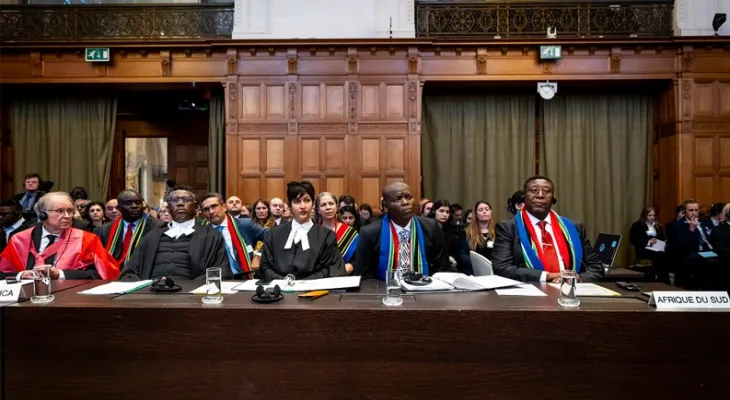Search here
Newspaper
Search here

Arab Canada News
News

Published: January 26, 2024
The International Court of Justice will issue today, Friday, its decision regarding the request for provisional measures in the genocide lawsuit filed by the Republic of South Africa against Israel.
The International Court of Justice in The Hague held two public hearings on January 11 and 12 as part of the commencement of the lawsuit filed by South Africa against Israel, accusing it of committing genocide crimes against Palestinians in the Gaza Strip, according to Anadolu Agency.
The court announced in a statement published on Wednesday that it will issue today, Friday, its order concerning the "request for the indication of provisional measures, submitted by South Africa in the case related to the application of the Convention on the Prevention and Punishment of the Crime of Genocide in the Gaza Strip".
The request submitted by South Africa on December 29 last year includes the indication of provisional measures to "protect against further serious crimes and irreparable harm to the rights of the Palestinian people under the Genocide Convention".
If the court adopts these measures, this decision will be binding on Israel, while the process of considering the merits of the case is expected to take several years.
* What will happen?
The International Court of Justice will announce its decision regarding South Africa’s request for an injunction live, in a public hearing held today, Friday.
During the reading of the decision, 17 judges, including 15 permanent judges of the court, and judges specially appointed by Israel and South Africa for this case, will be present in the courtroom.
The states parties to the case will not make any presentations or statements at the sessions where the decision is announced, and the lawyers of the parties will be present in the courtroom listening to the decision.
* What does the provisional measures decision mean?
The decision to be issued by the court does not relate to whether Israel acted contrary to the Genocide Convention, but only involves provisional measures that the parties must abide by until the final decision in the case is made, to prevent damages that may result from potential genocide.
The court considers it sufficient for South Africa to present "reasonable" grounds in its review of the provisional measures requests, and a review will be conducted to determine whether genocide occurred in Gaza.
The court is likely to make a decision regarding the provisional measures in line with South Africa’s demands, as it did not request "final" conclusions on the commission of genocide and considered the "reasonable" grounds sufficient.
Even if the court does not accept all of South Africa’s demands, it is expected that a decision will be issued calling for necessary measures to ensure compliance with international law during Israeli military operations in Gaza, ensuring the return of displaced persons to their homes and their access to humanitarian aid, including adequate food, water, fuel, medical supplies and hygiene materials, shelter, and clothing.
* Is the provisional measures decision binding?
According to Article 59 of the International Court of Justice Statute, decisions taken by it are binding on the parties, but are not binding on other states.
The court also notifies relevant United Nations bodies of its decisions, and if Israel does not comply with the possible court ruling, South Africa can submit the case to the UN Security Council and request necessary actions to enforce the court’s decision.
Since the court has neither its own military force nor an enforcement body for its decisions, the implementation of these decisions largely depends on the Security Council’s discretion. Other states are likely to find it more difficult to provide public military and political support to Israel due to the political pressures arising from the court’s decision.
South Africa requests the court to issue nine provisional decisions, including ruling that Israel immediately halt military operations in Gaza and refrain from taking steps that would reinforce any military operations in Gaza by any group under its control.
South Africa also demands that all necessary measures be taken to prevent genocide against the Palestinians, refrain from any act falling within Article 2 of the Genocide Convention, ensure the return of displaced persons to their homes, and guarantee their access to humanitarian assistance, including adequate food, water, fuel, medical supplies and hygiene materials, shelter, and clothing.
It also calls for taking the necessary steps to punish those involved in genocide acts, preserve evidence of genocide, not prevent international staff and other officials from accessing Gaza for this purpose, provide regular reports to the court on the implementation of the mentioned measures, and refrain from actions that would complicate or prolong the case.
Yesterday, Thursday, French lawyer Gilles Devers, who defends the Palestinian victims at the International Court of Justice, stated that the Office of the Prosecutor has sufficient evidence to issue arrest warrants against Israeli officials.
Devers added to Anadolu, “Among the evidence submitted to the court are numerous documents related to attacks on civilians in Gaza, targeting the health system, and the displacement of about two million people.”
Comments